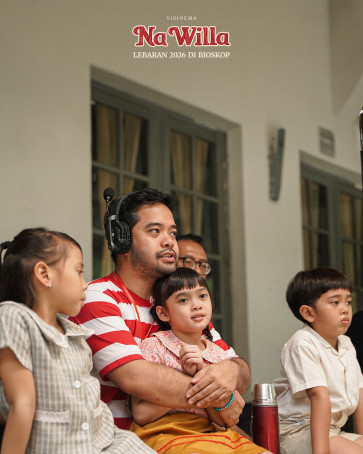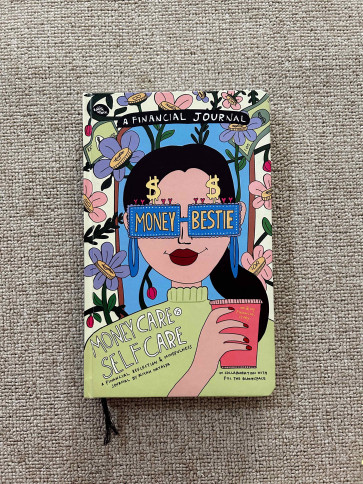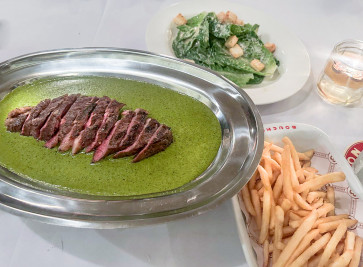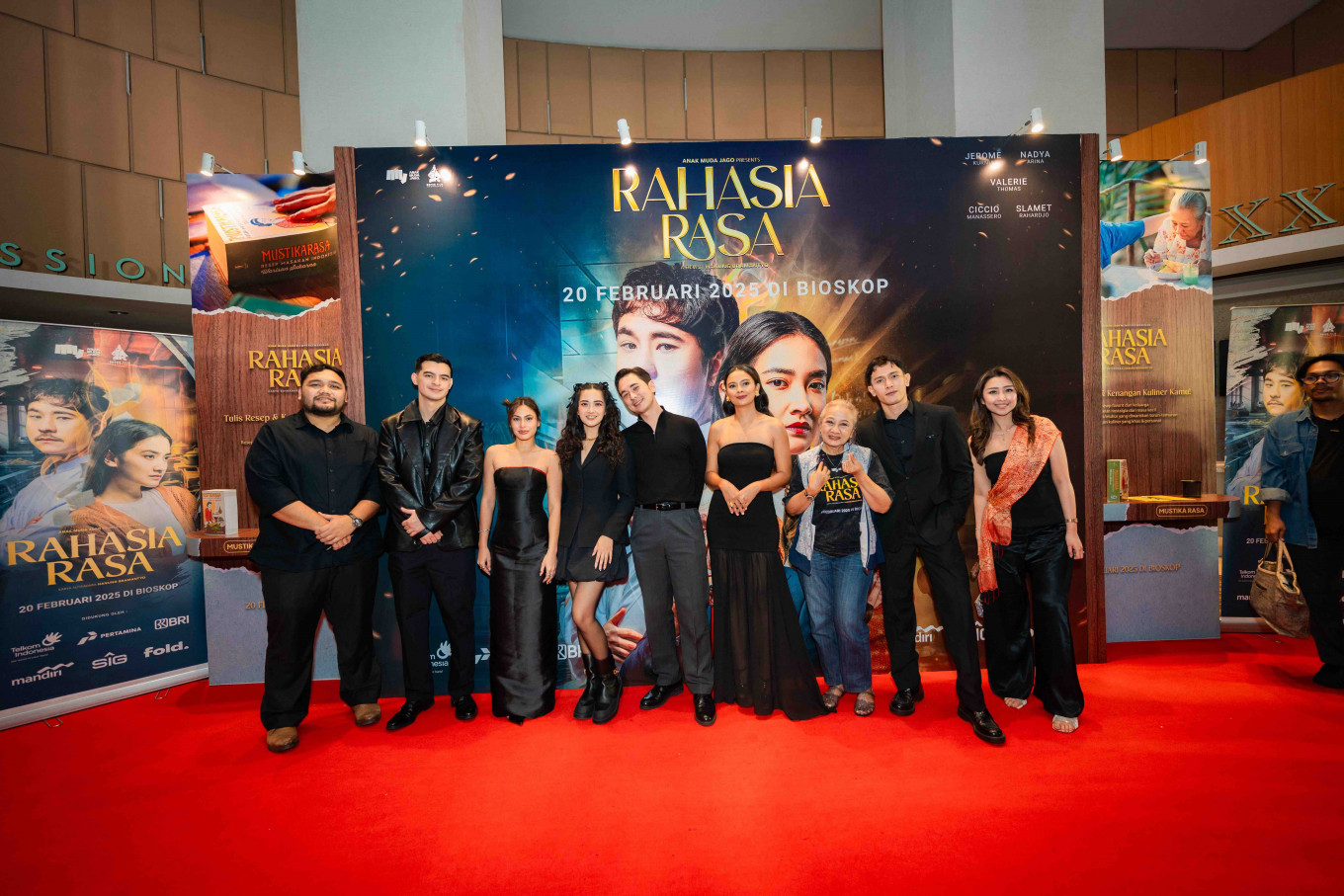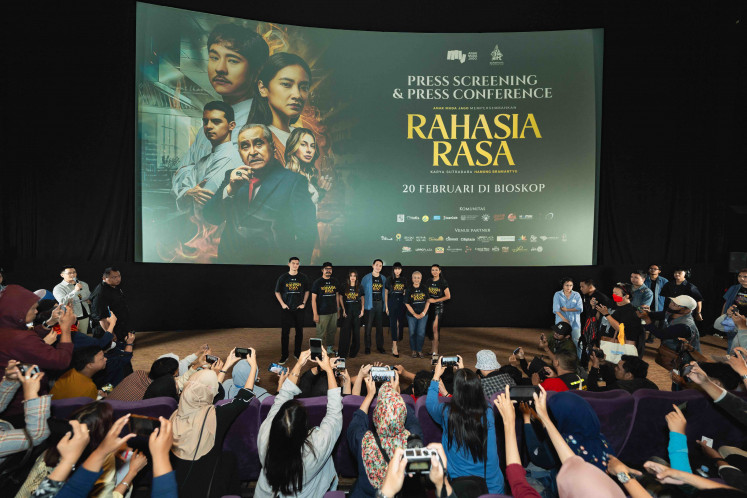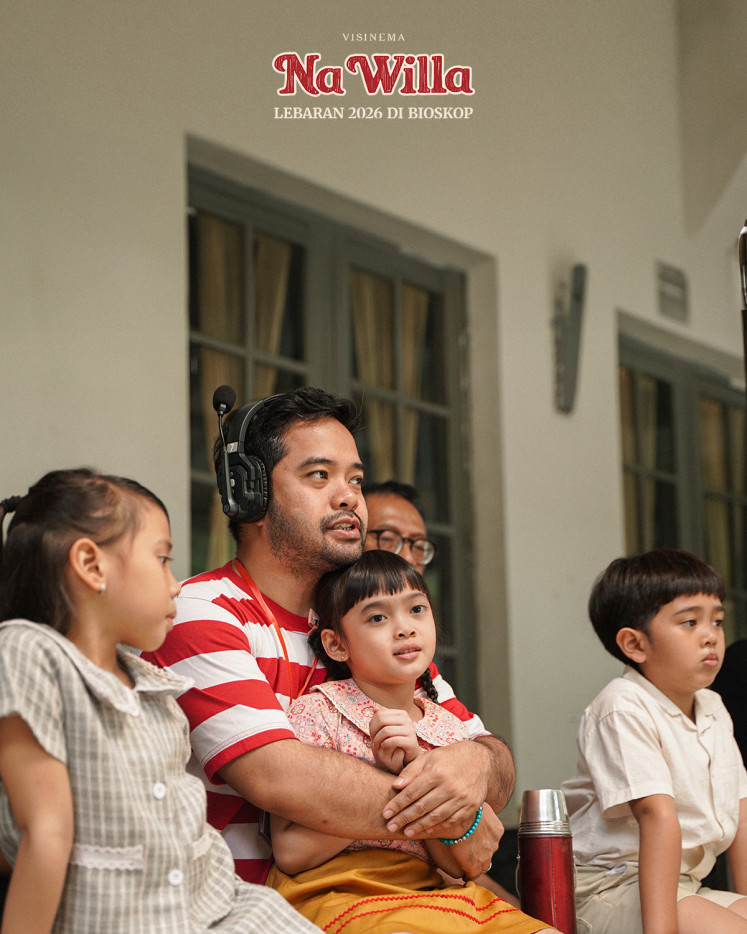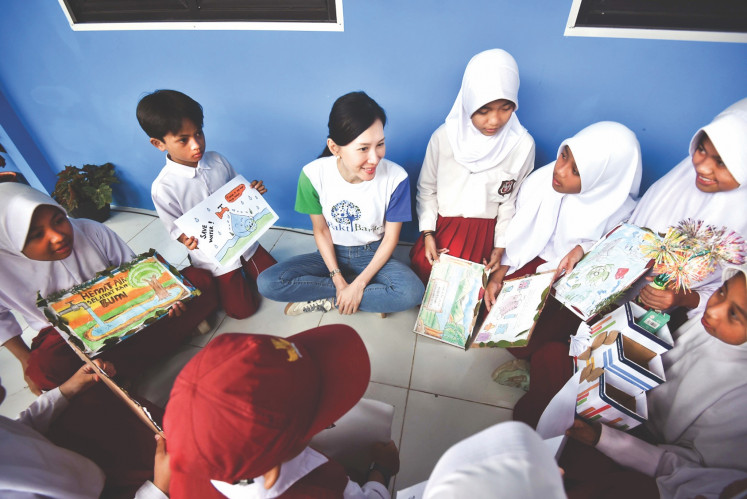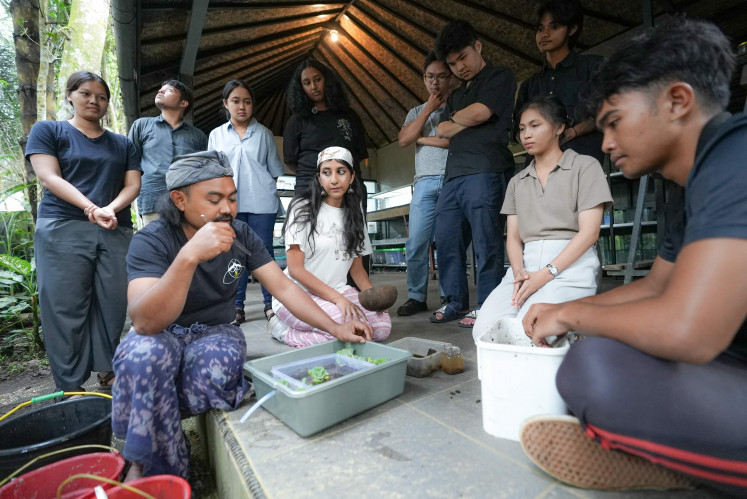Culinary adventure: The stars of Rahasia Rasa, including Jerome Kurnia (center) and Valerie Thomas (third from left), grace the red carpet on Feb. 13 during the film’s premiere at Epicentrum XXI.
Hanung Bramantyo is undoubtedly one of the most prolific directors this quarter.
His epic historical fiction, Gowok: Javanese Kamasutra, had its world premiere at the International Film Festival Rotterdam (IFFR) last month. His romance Cinta Tak Pernah Tepat Waktu (roughly translated to Love Never Comes on Time) hit theaters on Feb. 13. Then, just a week later on Feb. 20, he released his food-action film, Rahasia Rasa (The Secret of Taste).
In this latest film, Jerome Kurnia stars as Ressa, an obsessive Italian chef who loses his sense of taste after a devastating accident. To make matters worse, he develops an aversion to Indonesian spices, triggering nausea every time he smells them, a symptom of past trauma.
Following his therapist’s advice, he returns to his hometown, hoping to confront his past and rediscover himself. Along the way, he stumbles upon the legendary recipe book Mustika Rasa, a culinary artifact that turns out to be deeply intertwined with his identity.
Blending food and alternate history, this movie poses an intriguing question:
"What if Sukarno’s national recipe book contained something even more tempting?"

Thank you!
For signing up to our newsletter.
Please check your email for your newsletter subscription.
The film explores obsession through the lens of food and politics. The first half draws audiences into the rich world of gastronomy, while the second half takes a dramatic turn, unraveling a twist that makes the story even more compelling.
On food, obsession and politics
Much like Palme d’Or winners Parasite and Triangle of Sadness, Rahasia Rasa surprises viewers at its midpoint by shifting into a darker, more serious tone. Yet, the transition isn’t abrupt, as it is rather carefully foreshadowed from the start.
Writers Adi Nugroho, Hanung Bramantyo and Haqi Ahmad establish a strong connection between food and obsession, shaping Ressa as an ambitious, driven and obsessive chef, both in and out of the kitchen.
One striking scene features guests devouring pasta with their bare hands. Their ravenous behavior bordering on grotesque, suggesting something deeper lurking beneath the surface.
Then, the accident happens.
When Ressa returns to his hometown, he reconnects with his childhood friend Tika (Nadya Arina) and his caregiver, Mbah Wangsa (Yati Surachman). What begins as a personal journey of self-discovery soon takes an unexpected turn into the realm of politics.
The second half of the film introduces a historical backdrop, blending fact with an alternate history in the vein of Quentin Tarantino’s Inglourious Basterds and Django Unchained. Since Mustika Rasa was initiated under Sukarno’s leadership, the story naturally intertwines with the political turbulence of the 1960s.
If you think this makes the film too serious for mainstream audiences, think again.
Hanung Bramantyo is no stranger to crafting highly engaging historical epics. His works like Soekarno and Kartini prove his ability to balance historical weight with cinematic entertainment.
In Rahasia Rasa, Bramantyo ensures the film never feels too dense; historical context is conveyed through montages and voiceovers, a technique that keeps the narrative accessible and avoids overloading the audience.
Beyond its political elements, this film also thrives on genre-blending. The action sequences, especially those featuring the legendary Slamet Rahardjo, heighten the stakes, making the second half even more compelling.
But the film doesn’t stop there.
It also weaves in a romantic subplot, an area where Bramantyo excels. There are meet-cutes, love confessions and betrayals, all of which are tropes that might seem familiar but feel more refined and elevated compared to his earlier romance work in Brownies.
At its core, this movie mirrors Indonesian cuisine itself: Rich, complex and bursting with diverse flavors.
In the spotlight: The cast and crew of Rahasia Rasa take center stage at the film’s press screening and conference at Epicentrum XXI in Jakarta. (JP/Reza Mardian)
National culinary adventure
That said, there are a few aspects I wish had been explored further.
During the press screening, the cast and crew emphasized the importance of respecting national cuisine, yet the film presents an oversimplified view of what constitutes Indonesian food.
Given the country's rich culinary diversity, the film’s representation feels somewhat narrow. By the end, Ressa and Tika create a localized version of spaghetti, but the film never fully unpacks what “local” means in a broader sense.
For a film that carries the burden of proof in depicting Indonesia’s national cuisine, Rahasia Rasa remains heavily Java-centric. Of course, encapsulating the entire nation's culinary heritage in a single feature is a daunting task.
Even Edwin’s Aruna & Lidahnya, a road movie that naturally lends itself to culinary exploration, only manages to highlight two regions (East Java and Borneo).
This regional focus is a common pattern in Indonesian food films.
Saiyo Sakato and Tabula Rasa both center on Padang cuisine, but unlike Rahasia Rasa, these films never claim to offer a nationwide culinary journey.
In contrast, Rahasia Rasa subtly positions itself as a national culinary film, which sets higher expectations.
Interestingly, there are hints that Rahasia Rasa might be the start of a franchise. If so, the film’s limited scope could be a stepping stone rather than a shortcoming. If sequels follow, there’s an opportunity to expand the narrative and truly explore the diverse flavors of Indonesia.
This film also marks Anak Muda Jago’s first collaboration with Dapur Films, proving a promising start for a production company stepping into the culinary-cinema space. If this project is successful, I look forward to seeing what they cook up next.
Reza Mardian is a winner of the Best Film Critic award at the Festival Film Indonesia 2024 and a pawrent to two rescued cats. He writes screenplays every time he finishes rewatching La La Land or Lady Bird.






